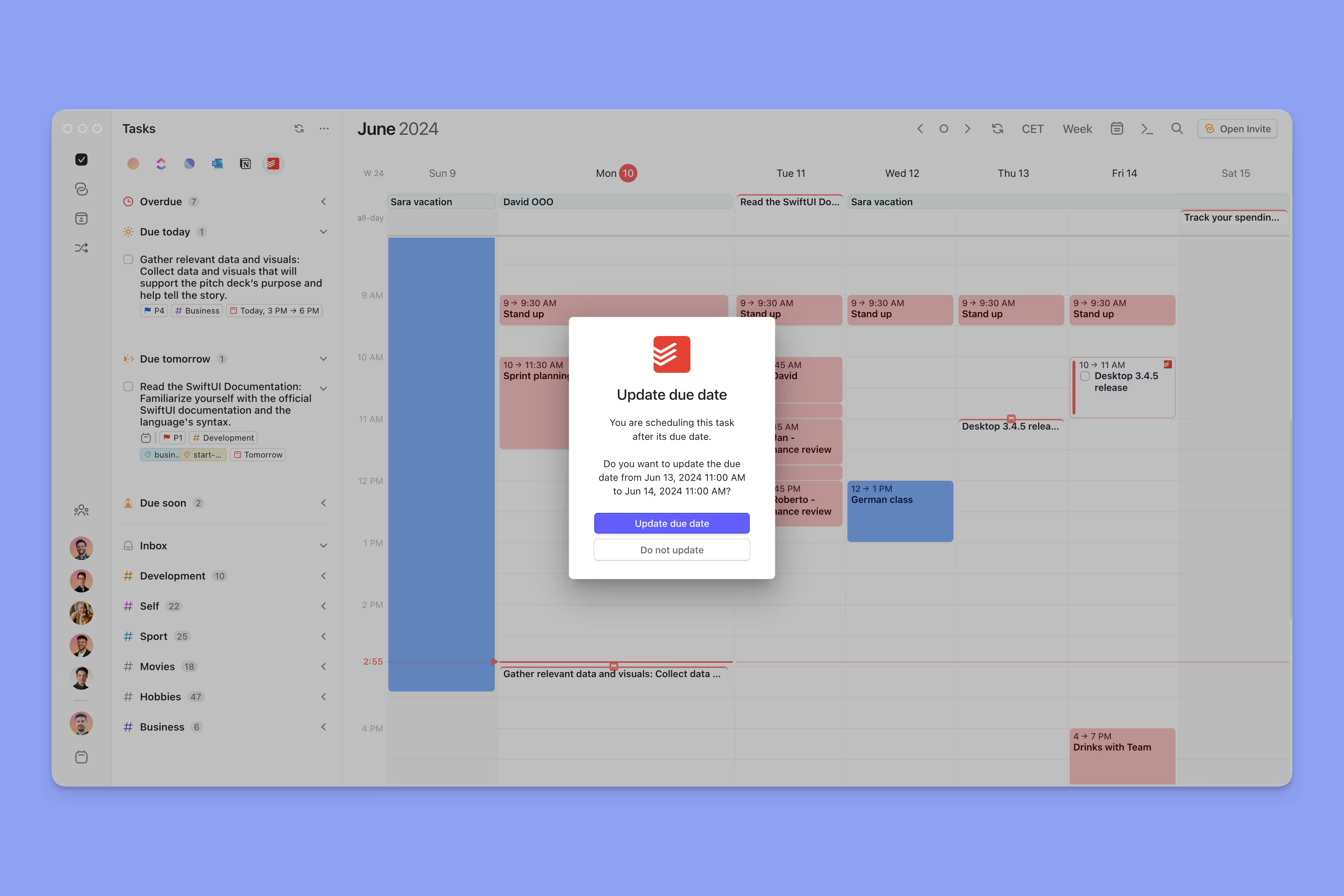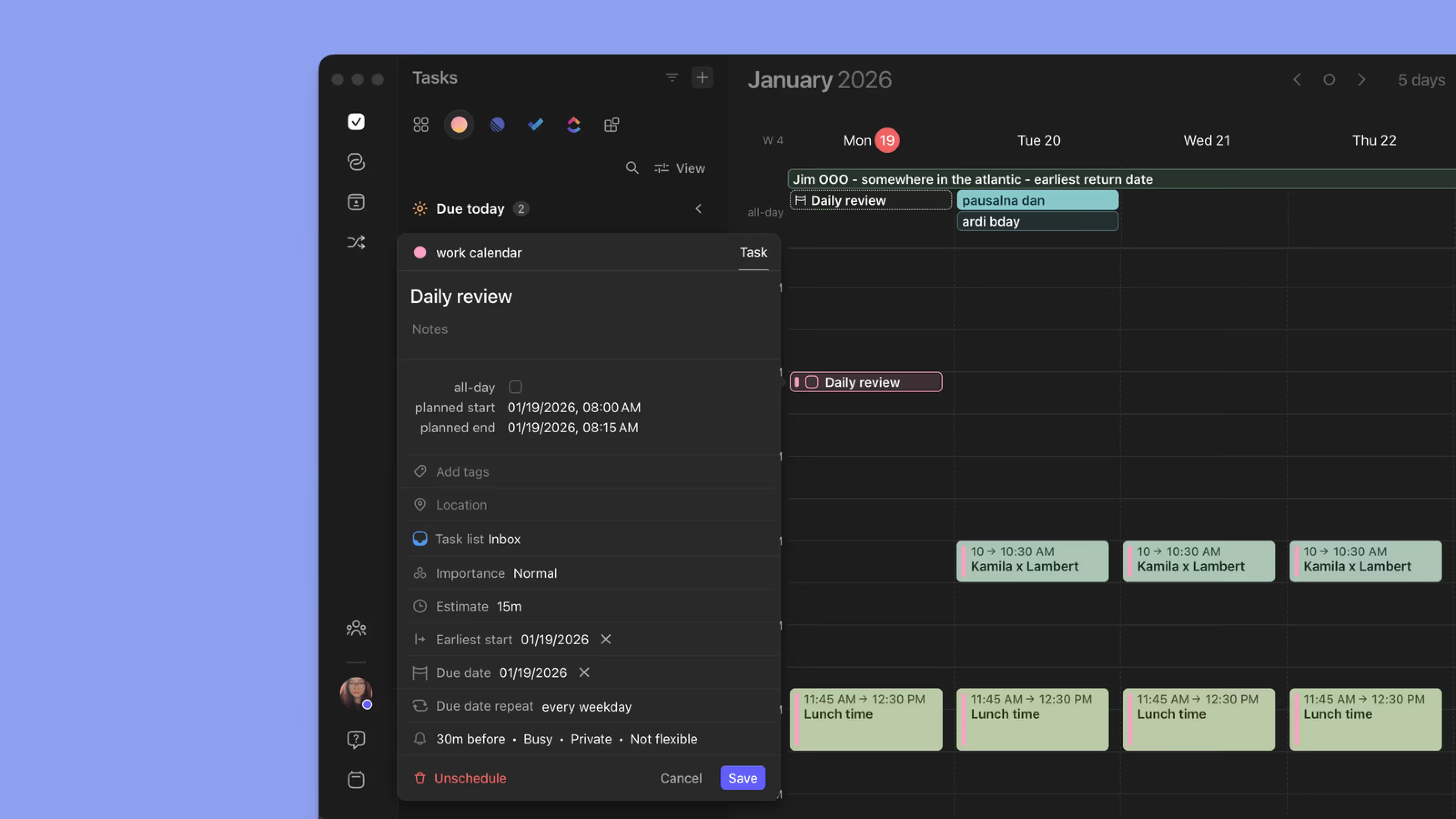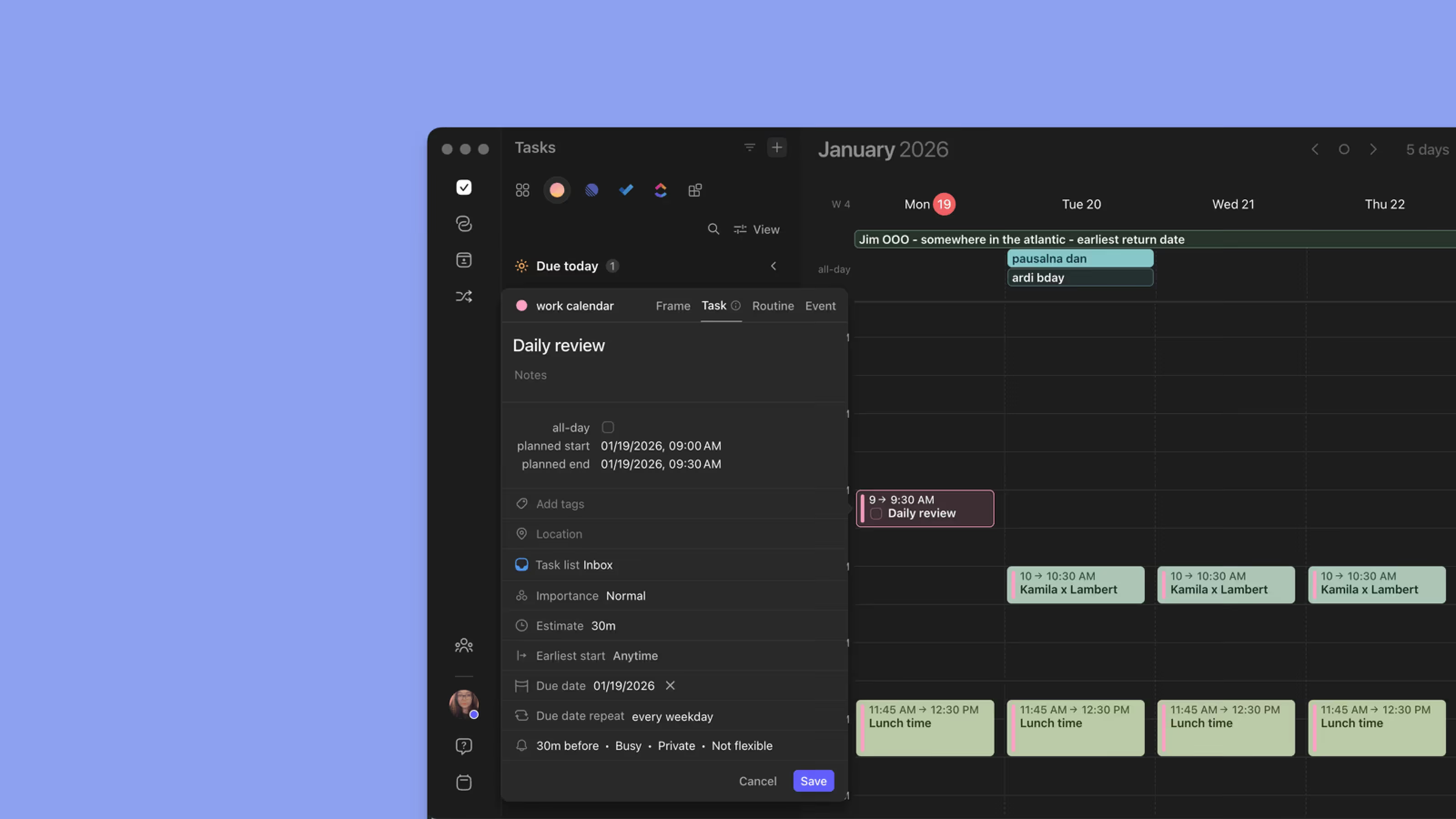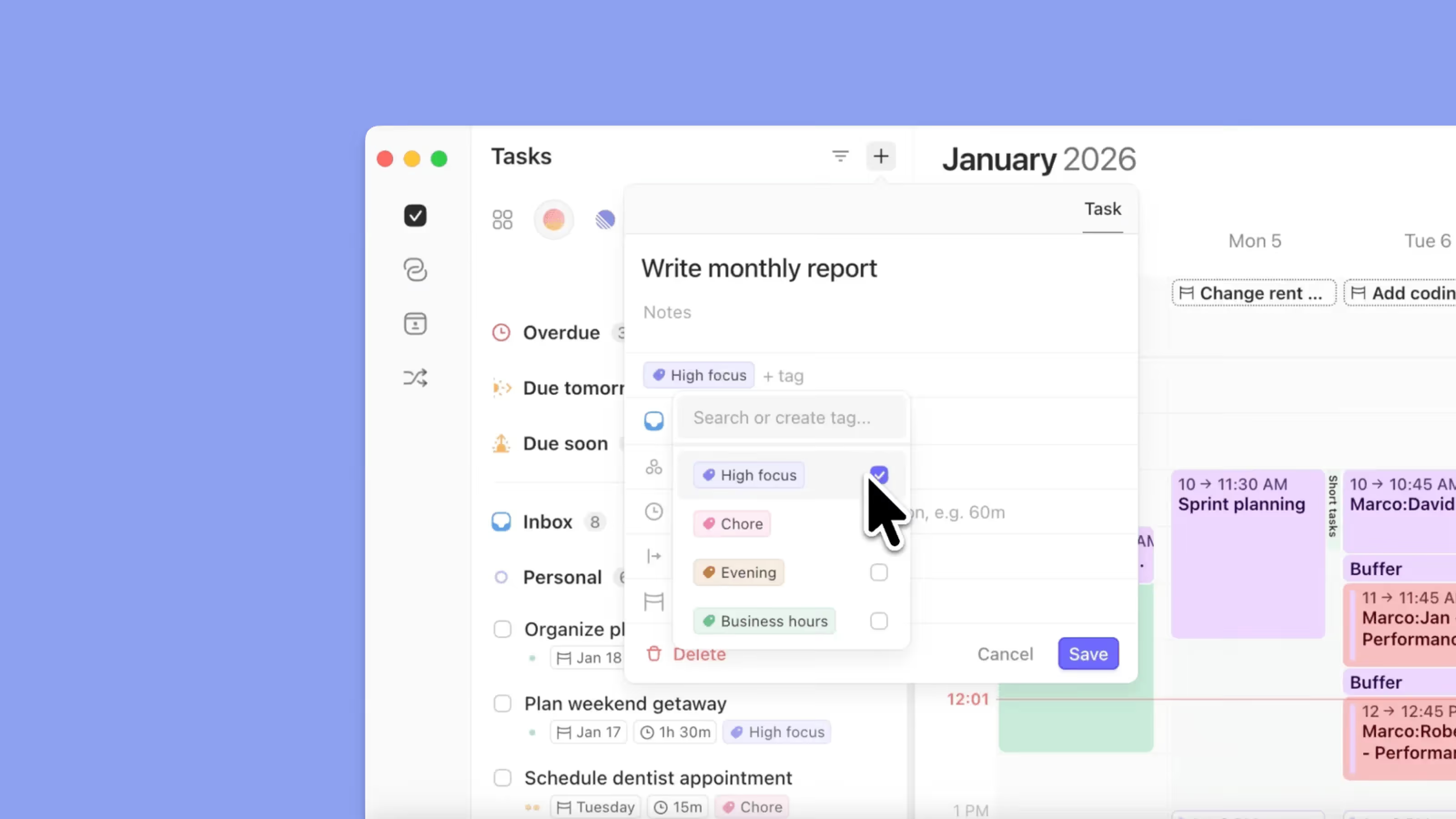Effective time blocking is now even easier in Morgen's app. When you opt to display due dates in your calendar, you will have a visual deadline from which to plan your work. You can even add a corresponding scheduled task in just one click; it will then be scheduled before the due date, helping you avoid the last-minute scramble to get work delivered on time.
Due date vs scheduled tasks
With Morgen, there are two distinct ways you can see your tasks in your calendar, both of which are important for realistic planning:
- Due dates: These are the deadlines you set for your tasks. In Morgen, these are easily identifiable in your calendar by the red finish line icon paired with a solid red line.
- Scheduled tasks (or ‘do’ dates): Scheduled tasks are the time blocks allocated to working on particular tasks. You can create multiple time blocks for any given task, and set it for as long as you need to complete it. These are easily identifiable within Morgen as transparent blocks in your calendar with a check box in the upper left corner (the check box will be empty until the task is marked as complete).
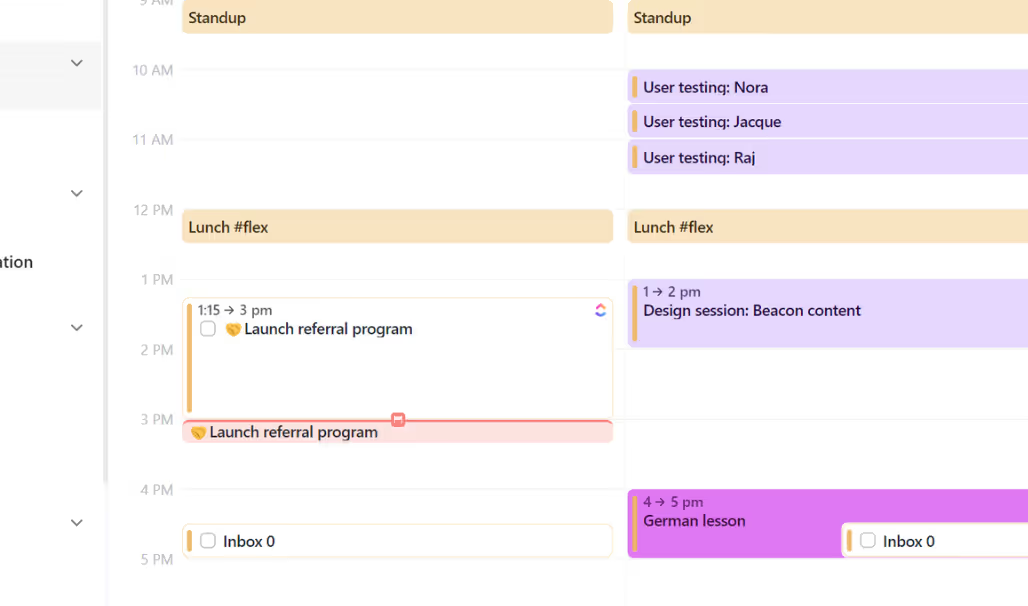
We think both ‘do’ and ‘due’ dates are helpful elements in building more realistic and accurate plans.
For the rest of this guide, we will focus on using and managing due dates in Morgen. If you want to learn more about time blocking your scheduled tasks, you can reference our guide to time blocking.
Display due dates in Morgen
You can display due dates for tasks created natively in Morgen and imported from Todoist, Notion, Linear, and ClickUp. By default, task due dates from these sources will be displayed in your calendar (on desktop only). (You can opt to turn those off in the Views for each integration tab by unchecking Manage due dates on the calendar.)
If you have tasks from multiple sources, you can choose whether to display due dates from one source and not from another. For example, if you use ClickUp at work and Todoist for your personal to-dos, you can have your ClickUp due dates displayed and not your Todoist one.
Depending on the details provided in your task metadata, the placement of your due dates will differ:
- At a specific time: Tasks from Notion, ClickUp, and Todoist, may have a specific time associated with their due date. When that is the case, the due date will appear at that time in the calendar.
- All day: Tasks from Morgen and Linear only support the creation of due dates, not specific times. As a result, these tasks will be displayed in the all-day section at the top of your calendar. They cannot be pulled into the calendar for a specific time, as these task sources can’t support that parameter.
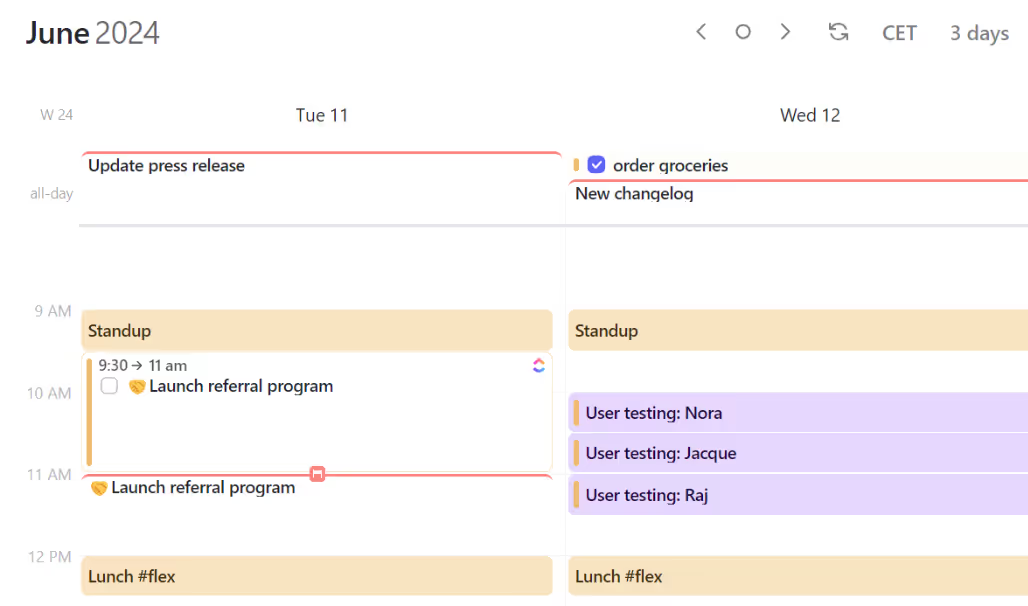
In some instances, tasks that appear in the all-day section can pulled into the calendar. This is the case for Notion, ClickUp, and Todoist tasks. When no time of day is specified in those task sources, they will appear in the all-day section. They can be dragged to a particular time in your calendar, which will update the time in your task source.
Note that due dates in your calendar are there as a visual reminder. These do not mark your calendar as busy and will not affect your availability through scheduling links, etc.
Due dates for recurrent tasks
In the case of recurrent tasks from Todoist and Notion, the upcoming due date will be displayed in your calendar. Once that task is completed, these sources generate the next due date, which will then be displayed in Morgen. We recommend you do not change these due dates in Morgen by dragging a due date to a different day/time, as it may break the recurrence pattern in your task source.
This differs from a recurrent task in Morgen which is set up by adding a recurrence pattern in the initial scheduled task. These will not be reflected as due dates.
Schedule time to work on tasks
To ensure you meet your due dates, we recommend scheduling time to work on important tasks in your calendar. You can do so by dragging those tasks from the task panel and dropping them in your calendar. Alternatively, you can click on a due date, and choose Block on the calendar. This will schedule time to work on this task in advance of the deadline.
.avif)
When you opt to generate a scheduled task in this way, keep in mind:
- For tasks in the all-day section, the time block created will be set before the end of the day on which the task is due.
- If no duration has been set for the task, by default the block will be created for one hour. This can be adjusted mannually by extending or shrinking the duration of the time slot. If a duration is specified in the task details, the time block will be sized accordingly.
- The time block generated will be scheduled in the calendar set as your default task calendar in your preferences. You can edit a scheduled task and move it to a different calendar on a case-by-case basis.
- Depending on your default settings, these scheduled tasks may mark your calendar as busy at those times. If you want them to be free, you can edit the scheduled task or the default settings.
Update the due date from Morgen
You can now update due dates for tasks from Notion, ClickUp, Linear, and Todoist from Morgen. These changes will sync with the source so you always see the same due date in both places. There ways to do so.
First, from your task panel, click on any task with a due date. Next to the date, click the edit icon and select a new date. Once updated, it will sync back to the source and you will see a confirmation message in the lower right corner of your Morgen app. If you display due dates in your Morgen calendar, it will shift accordingly.
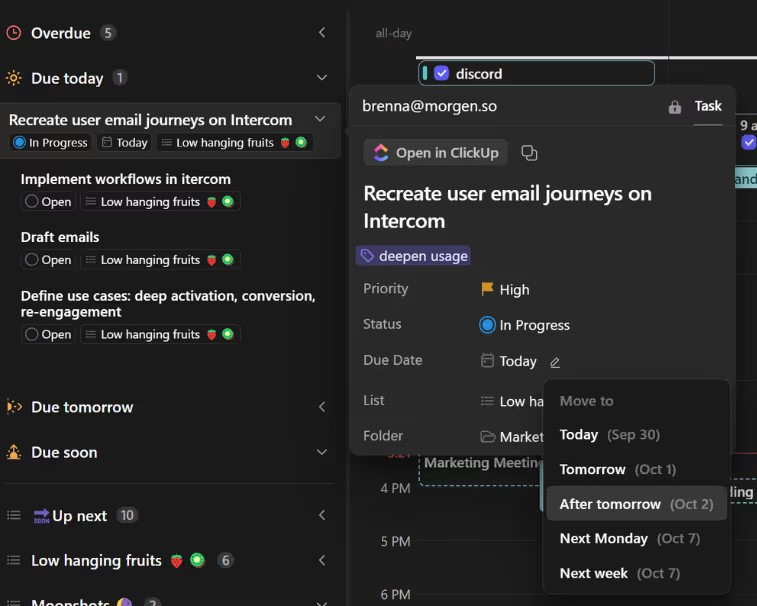
You can also update due dates directly from your calendar. To do, simply drag the due date in your calendar to another time.
Additionally, if you schedule time to work on a task that falls after the due date, you can opt whether this should automatically update the due date as well. In your preferences, select whether scheduling task after the due should:
- Automatically push the due date to the end of the corresponding scheduled task. (In this case, choose Always.)
- Prompt the question as to whether you want your due date rescheduled. (In this, choose Ask every time.)
- Not impact the due date. (Choose Never in this case.)
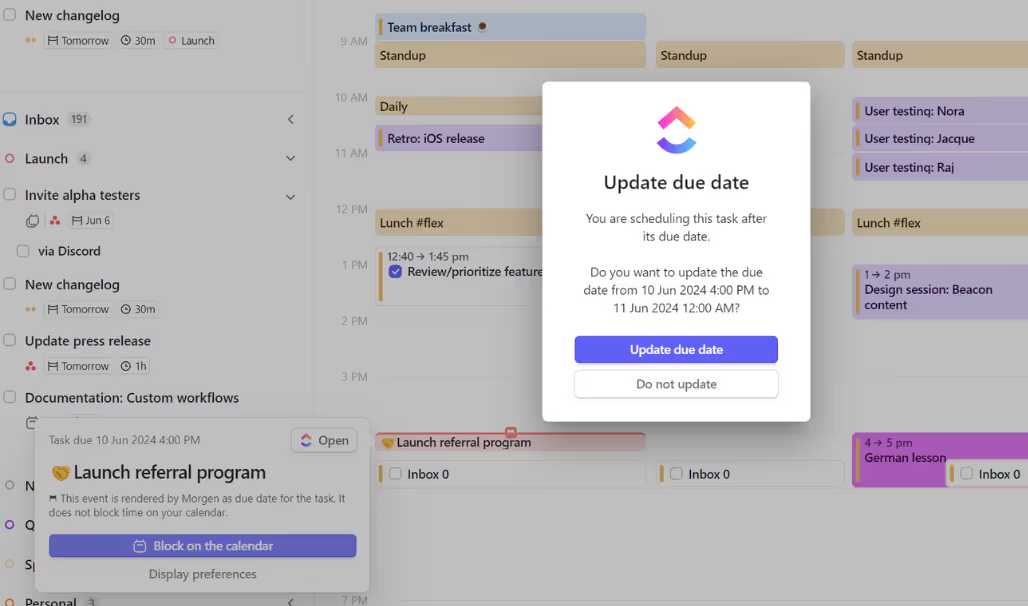
Note: Due dates from external sources cannot be updated from the Morgen task panel. This can only be done within the calendar.
Your feedback
Displaying due dates is currently in Beta. If you have any feedback, we would love to hear it. Please join the conversation on Discord and share your experience with this feature.
.avif)
